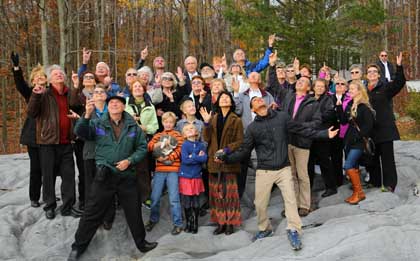
Today we spent a wonderful Sabbath at the William Miller farm in Low Hampton, New York.
As I listened to the stories of William Miller and those who followed him, I was touched again by the sacrificial spirit that moved these passionate believers.. They were willing to stand by their beliefs regardless of ridicule, scorn or derision.
For all his later faithfulness, it took William Miller many years to fix his heart on Jesus. A respected justice of peace and veteran of the war of 1812, he didn’t have much time for religion. In fact, Miller was a Deist. God played no role in Miller’s world—and yet, God patiently used providence, circumstances, and people to draw Miller to Himself—at the right time.![SOON AND VERY SOON: On Ascension Rock we try to imagine the moment. [PHOTO: GK]](https://adventistreview.org/wp-content/uploads/2022/01/13-10-20-2.jpg)
Once converted, he spent two years studying Scripture. He didn’t surrender his brains when he entered church. He realized that the God of revelation was also the God who had created our powers of reasoning. Following his intensive study, he wrote: “I was constrained to admit that the Scriptures must be a revelation from God. They became my delight; and in Jesus I found a friend.” His friendship with Jesus sustained him as he preached the imminent second coming of Jesus before thousands of people for more than a dozen years. Scholars estimate that the Millerite movement encompassed at its height more than 500,000 people in North America. This was no irrelevant, backwater Christian sideshow—it was loud, it was noisy, it was fearless, and it was passionate.
Then came October 22, 1844. Some of the Low Hampton Millerites awaited their Saviour on the rocky outcropping near the Miller farmhouse known as Ascension Rock. They waited and waited—but Jesus did not come. The ridicule and laughter was unbearable; the disappointment was gut-wrenchingly profound. It was Miller’s friendship with Jesus, however, that helped him survive the months following the Great Disappointment. He continued to wait for Jesus to come, as he wrote a few weeks later-- “today, today, and today, until He comes, and I see Him for whom my soul yearns.”
Faithfulness in difficult circumstances seems to have been a trademark of many of our early leaders. Second-generation leader W. A. Spicer wrote to his wife just before he was elected General Conference president in 1922: “There are no posts of honor, but only posts of service.” Somehow I hear an echo of Philippians 2:5–8: “Let this mind be in you which was also in Christ Jesus, who, being in the form of God, did not consider it robbery to be equal with God, but made Himself of no reputation, taking the form of a bondservant, and coming in the likeness of men.”
Or take Percy T. Magan, one of the early educators of the fledgling Seventh-day Adventist Church. Early in his ministry, as he was facing opposition to his wholistic approach to education, he had received a tempting invitation from W. K. Kellogg to join the new company producing cornflakes as its director of the sales department. Magan spent an entire night praying about this tempting invitation. In the morning he knew the direction he needed to go. Many years later he wrote to a friend, “I must stick to this message.” Selling cornflakes (and making money: imagine what his promised share of 15% in the Kellogg company stock would be valued today?) just couldn’t compare to shaping and molding young minds searching for direction and a mission.
We heard the moving story of J. N. Andrews before a very special communion service this afternoon in the William Miller Chapel. This scholar, author, administrator, Review editor, and above all, first official cross-cultural missionary experienced uncounted moments of deep pain and loss. Widowed when his wife died from tuberculosis, Andrews had taken his two teenage children with him to his posting in Basel, Switzerland. When his daughter Mary also succumbed to the same disease after only a few years in Europe,, he wrote to a friend: “I am holding on to Jesus with a numb finger.”
We can hear his pain: some of us can certainly identify with his sense of loss. In the midst of the pain and disappointment that I experience, I also ask Jesus to help me hang on—even if my finger is numb!